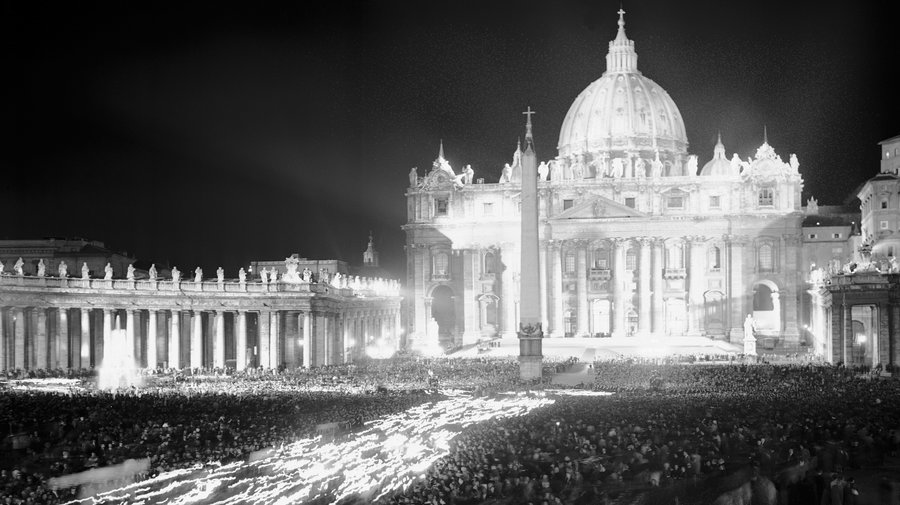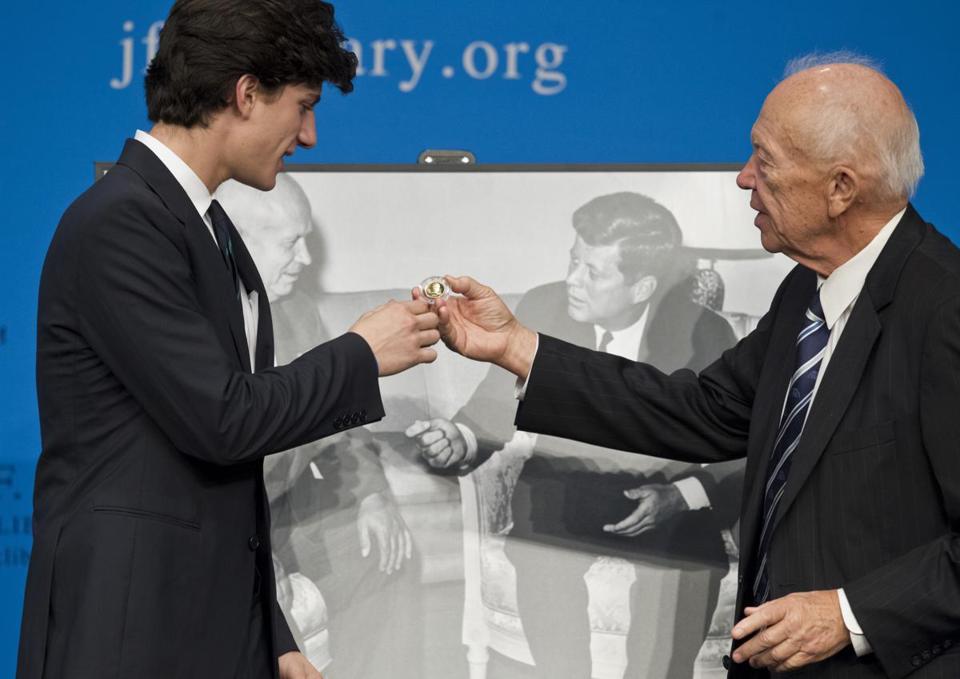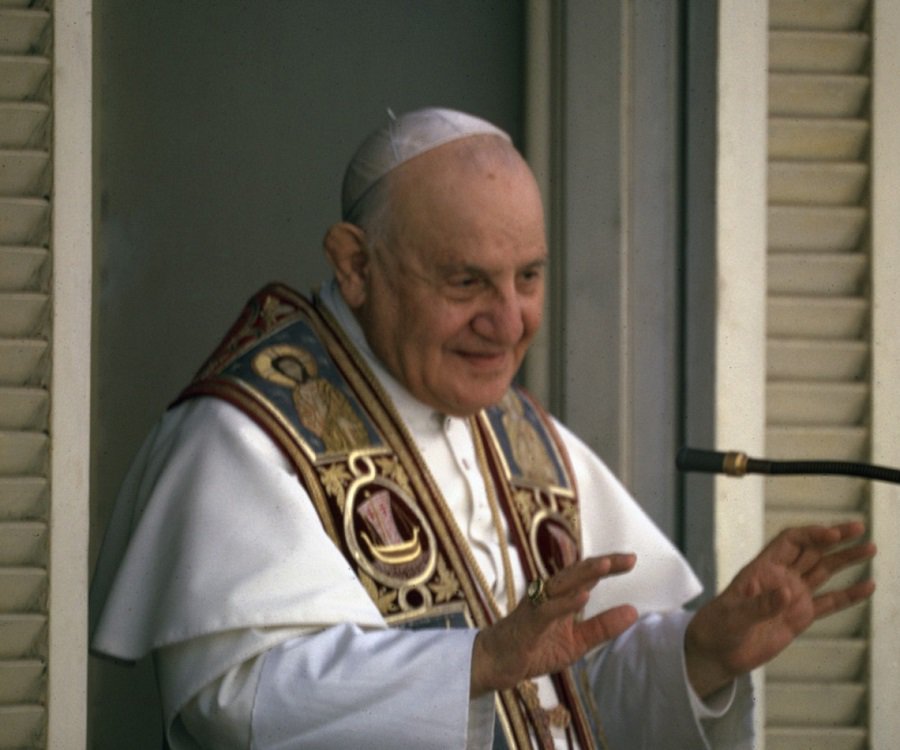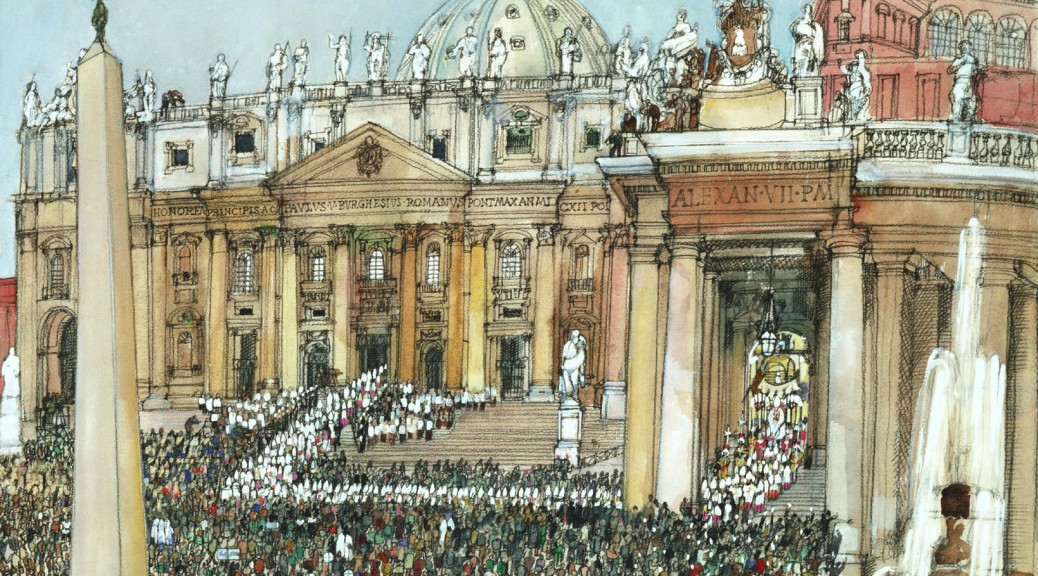(Image: Painting of the Great Procession into St. Peter’s for the opening of the Second Vatican Ecumenical Council, October 11th, A.D. 1962. Artist, Franklin McMahon. This article is the Pastor’s Note from the Mary Immaculate of Lourdes Parish Bulletin for October 21, 2012)
On the night of October 11th, 1962, capping the opening day of Vatican Council II, two hundred thousand people filled St. Peter’s Square. Youths from Catholic Action, carrying lighted torches, formed a giant cross of light around the central obelisk (photo:below). The large, enthusiastic crowd was chanting and singing. Finally, Pope John XIII appeared at his window. “Dear children, dear children,” he called down to them, “I hear your voices.” There followed a conversation between the Pope and the crowds below. “Now go back home,” he concluded, “And give your little children a kiss—tell them it is from Pope John.”

The following day, October 12th, Pope John XXIII had an audience with the diplomats of 79 nations who had come to Rome for the opening of the Council. In his welcome he expressed his hope that this Church Council would contribute towards world peace, “peace based on growing respect for the human person and so leading to freedom of religion and worship.”
The happiness and the expectation of the Vatican Council’s opening days were quickly overshadowed, however, by the event of the Cuban Missile Crisis. On October 15th, US reconnaissance photos confirmed that the Soviets had placed nuclear missiles in Cuba in close range of the United States. On October 20th, President John F. Kennedy imposed a naval blockade on Cuba. For the next eight days the catastrophe of nuclear war threatened.
Behind the scenes diplomatic efforts were underway to avert war, and in those efforts Pope John XIII played a crucial part as a discreet intermediary. After the Crisis was past the Soviet leader Krushchev himself acknowledged the Pope’s role: “What the Pope has done for peace will go down in history.”
On October 23rd, President Kennedy called Norman Cousins, author of a book which argued that the only “third-force” in a two-power stand-off was the Papacy, and said he wanted to make contact with the Vatican. Cousins then spoke with a Belgian Dominican priest Fr. Félix Morlion, O.P., who had contacts in the Vatican and who was also at that moment in Andover, Massachusetts, engaged in a dialogue with a delegation of visiting Soviet scientists. The scientists were anxiously trying to get home but Norman Cousins persuaded them to talk with Fr. Morlion, who had already received the go-ahead from the Vatican that Pope John would be willing to help in any way he could.

As a former Papal nuncio, Pope John understood what was expected of him. His help took the form of two signals to Krushchev—one through his weekly audience on October 24th, the other a message to the Soviet embassy in Rome, broadcast on Vatican Radio that afternoon, which would give the Soviet dictator the face-saving cover he needed to retreat, as a lover of peace. On Friday morning, October 26th, the official Soviet newspaper Pravda put Pope John’s message on its front page under the banner head-line: ‘WE BEG ALL RULERS NOT TO BE DEAF TO THE CRY OF ALL HUMANITY’.
On Sunday, October 28th, Pope John said the votive Mass for Peace in his private chapel. After the Mass he was brought a message which had just arrived from President Kennedy, thanking the Pope for his help. Krushchev had agreed to withdraw the missiles and the Soviet ships headed to Cuba were already turned back. Not only was the immediate crisis resolved but Krushchev wanted further contacts to discuss disarmament and détente. (John XIII: Pope of the Century, by Peter Hebblethwaite, revised edition, A.D. 2000.)
The newspapers in Rome that Sunday morning had been published before this latest news and were filled with alarm. At his noon Angelus Pope John XXIII was able to bring the anxious crowd gathered good news as well as hope. It was the Feast of Christ the King and the 4th Anniversary of his election as Pope.
There have been four years of prayer and service, of meetings and conversations, of joy but also some suffering: but everyday has been lived with a readiness to do the divine will, and in the confidence that all things work together for the edification of all. On today’s feast of Christ the King, I feel deeply moved and my spirit is led to serenity and calm. The word of the Gospel has not changed; but it rings out to the ends of the earth and finds its way into human hearts. Dangers and sufferings, human prudence and wisdom—all these should issue into a canticle of love, and a renewed plea, addressed to all men, to seek and restore the Kingdom of Christ.

